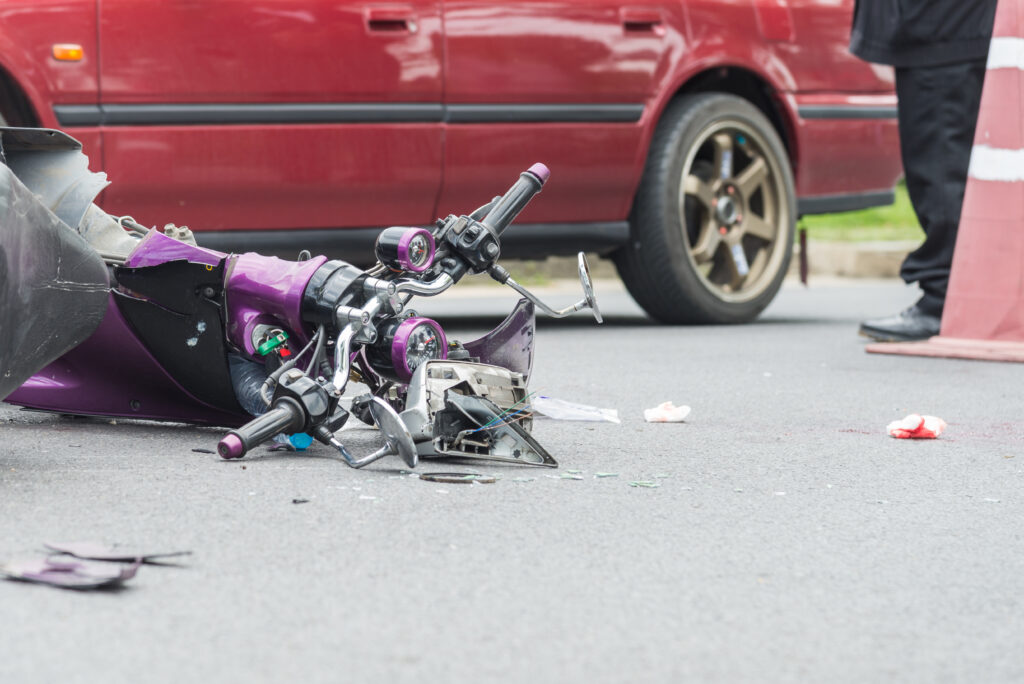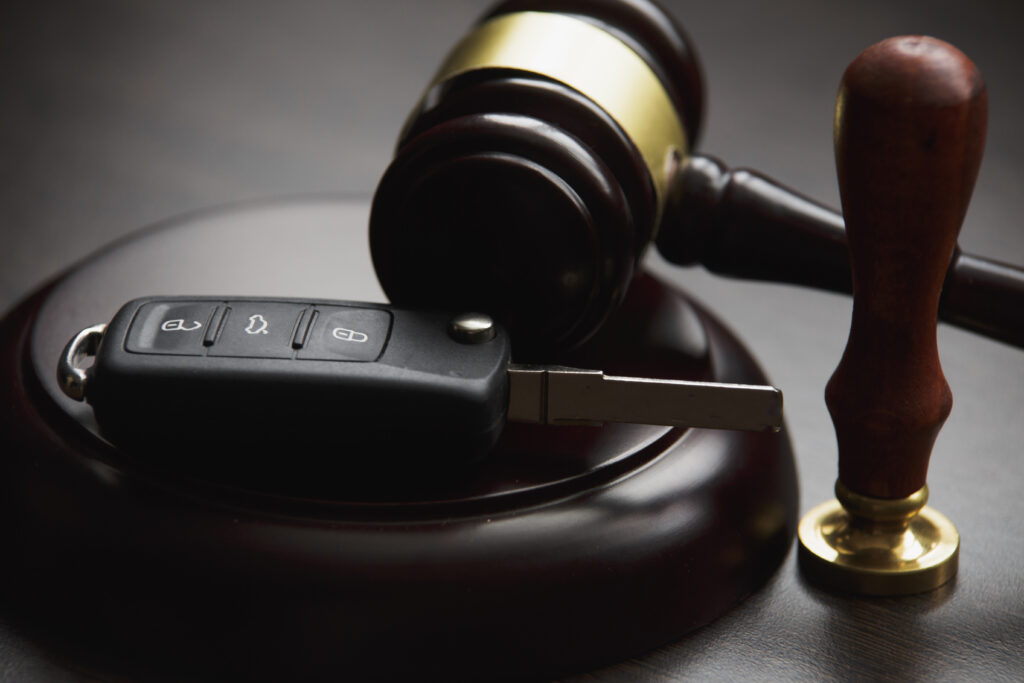A motorcycle accident can be a harrowing ordeal. Due to the motorcycle's lack of protection, the rider and passenger are likely to suffer debilitating injuries when a crash occurs.

Since motorcyclists face a greater risk of experiencing a detrimental injury and a longer road to recovery, an accident can place major emotional and financial burdens on both injured victims and their family members.
However, when an accident results from someone else's fault, you may want to consider suing the at-fault party to fight for the financial compensation you deserve.
Unfortunately, many victims hesitate to file a lawsuit following a motorcycle accident because they do not know what the legal process entails. A motorcycle accident lawyer in Creve Coeur can help you understand how long it will take to resolve the case and get the compensation you need to pay your bills and return to your normal lifestyle.
Factors That Affect How Long a Motorcycle Accident Lawsuit Will Take
Many factors affect a lawsuit's timeline when a motorcycle accident victim initiates legal action.
Some depend on external circumstances, while others hinge on your decisions and choices during court proceedings.
- How soon you hire an attorney: One of the most crucial factors determining the duration of any lawsuit is how quickly you contact an attorney after the accident. Getting legal representation early can help speed up the process. You need someone ready to handle all legal aspects of your case. Your attorney can start investigating the accident and dealing with the other party's insurance company, which can expedite the settlement process and move forward with the lawsuit.
- The challenges of a case investigation: An in-depth investigation is vital to building a strong case. The investigation can take time, regardless of how skilled your attorney is. Some things are out of your attorney's control when investigating the accident. There might be challenges in getting the necessary evidence (e.g., access to camera surveillance footage) or identifying witnesses to get their statements. The more complex the case is, the longer it can take to investigate, so be ready for a longer duration if that's the case.
- The time it takes to reach maximum medical improvement (MMI): If you have suffered injuries in your motorcycle accident, the timeline of your lawsuit will depend on how long it takes you to reach maximum medical improvement. MMI is the point in your recovery where further improvement is not reasonably expected. Generally, you don't want to settle your case until you know the extent of your injuries, as you risk losing out on the compensation you deserve. If an injury requires long-term treatment and monitoring, the case might take longer to settle or go to trial.
- The jurisdiction where you file your case: Every state has its statute of limitations, which limits how long you have to file a lawsuit after an accident. This limit can range from a few months to several years, depending on where you live. For example, Missouri’s statute of limitations sets a five-year deadline for injured victims to initiate legal action. You must file your lawsuit on time if you want to receive compensation, so work with an attorney who knows the law in your area.
- The parties' willingness to compromise: If at least one party refuses a fair settlement offer, the case can take longer to reach a resolution. On the other hand, if both parties will compromise, they can reach a settlement outside of court faster.
- The number of disputed facts: The more contested facts in your case, the longer it will take to resolve. For example, if it's unclear who was at fault, it might take longer to gather the necessary evidence to prove that the other party should be liable for your damages.
- Your patience level: Although you might want to settle your case as soon as the other party makes an adequate settlement offer, lawsuits take time. You don't want to expect a quick resolution or rush through the process and later regret settling for less than what you deserve.
Instead of asking, "How long does a motorcycle accident lawsuit take?" it may make more sense to wonder, "How do I go through the process without compromising my financial recovery?" Remember: your patience and diligence during the process will ultimately help you secure a fair settlement payout.
Examples of Damages You Can Recover in a Motorcycle Accident Lawsuit

In legalese, "damages" refer to the money awarded to the injured party. If you suffered harm because of someone else's negligent conduct, you should not have to shoulder the costs of your motorcycle accident.
You have a right to file a lawsuit and demand fair compensation for your damages, including:
- Medical expenses: Outstanding hospital bills, doctor or specialist consultation fees, ambulance fees, and rehabilitation therapy costs are some examples of medical expenses you may incur in the aftermath of a motorcycle accident.
- Lost income: A victim may need to take time off work to get back on their feet and recover after a severe accident. Lost income from missed work can include both past and future earnings.
- Loss of earning capacity: If a victim is unable to continue in their previous career due to injuries – something that is not uncommon for victims of motorcycle crashes – they may claim damages for diminished or lost earning capacity. This category of damages considers the victim's decreased ability to earn money in the future.
- Pain and suffering: Pain and suffering are subjective, non-monetary damages, including emotional trauma and physical pain. Like any other non-economic damages, pain and suffering do not have a dollar value assigned to them.
- Property damage: If your motorcycle is damaged beyond repair or needs repairs to be operational again, you can request compensation for the cost of repairs or replacement.
- Loss of consortium: If your partner has suffered injuries in a motorcycle collision and your relationship has changed as a result, you can seek compensation for all the added stress and burden.
- Scarring and disfigurement: If the accident resulted in permanent scarring or disfigurement, your award can include compensation for the impact your scars or marred appearance of beauty has on your quality of life.
- Loss of enjoyment: This refers to the inability to partake in activities you once enjoyed, such as playing sports, swimming, or others.
- Punitive damages: These damages punish the party at fault for their careless actions and deter them from repeating them. While some states prohibit punitive damages in personal injury awards, others make them available only under specific circumstances. For example, Missouri law requires the plaintiff to demonstrate clear and convincing evidence that the defendant acted (a) intentionally or (b) with deliberate disregard for the safety of others to receive punitive damages.
Depending on your circumstances, these and many other damages may be available. Filing a lawsuit against the negligent party may allow you to maximize your compensation and recover a full spectrum of damages compared to accepting an out-of-court settlement.
Potential downsides of litigation are its high cost and unpredictability, making it less appealing to injured victims looking for compensation.
What to Expect During the Motorcycle Accident Lawsuit Process?

This step-by-step look at the motorcycle accident lawsuit process can provide a roadmap to help navigate the legal system more efficiently and know what to expect.
However, some of these steps may differ depending on your jurisdiction and the unique circumstances surrounding your case:
- Filing a complaint: The first step in the litigation process is filing a complaint. This document outlines the victim's claim against the party responsible for the accident. It briefly describes the accident, a statement of legal claims, and a demand for compensation. The victim or their attorney submits the complaint to the court to initiate the legal process. Once you file the complaint, the defendant will have a set amount of time to respond.
- Discovery: Discovery is the process of exchanging information between the parties involved in the case. It includes gathering evidence, exchanging documents, and interviewing witnesses. Discovery is a crucial element of trial preparation, allowing both parties to review all the evidence presented at trial.
- Pre-trial motions: Pre-trial motions are legal requests made by either party before the trial begins. These motions can include requests to dismiss the case entirely, exclude certain evidence, or limit the scope of the trial. The judge will review each motion individually and decide whether to grant or deny the request.
- Alternative dispute resolution: Alternative dispute resolution (ADR) is a more informal method of settling disputes outside court. It can include mediation, arbitration, or settlement negotiations. ADR can be an advantageous alternative to trial because it is often faster, cheaper, and less hostile. Your attorney will review the facts of your case to advise you on whether you should proceed with litigation or its alternatives.
- Trial: If the case does not settle in ADR, it will proceed to trial. Both parties will present their evidence and arguments to a judge or jury during the trial. The judge or jury will then decide who is responsible for the accident and, if the plaintiff prevails, the amount of compensation to award.
- Verdict and award: Once there is a verdict, the judge will enter a judgment in favor of the winning party. If the plaintiff wins, the judge will decide on the award amount.
- Appeals: If either party is unsatisfied with the trial's outcome, they can appeal the case to a higher court. A court will review the evidence and then make a ruling on the appeal.
Some of these steps may take less than 24 hours to complete, while others may take far longer, depending on the judge's schedule, the caseload in your jurisdiction, the complexity of your case, and many other factors.
How Can an Attorney Help You During Litigation After a Motorcycle Accident?
An experienced attorney can be your greatest ally in navigating the complex legal system and ensuring you are rightfully compensated. Some things an attorney will handle during litigation are:
Prepare Testimonial Evidence
Your lawyer can collect all the necessary evidence to support your case and prove your arguments. It includes obtaining statements from witnesses, police reports, and medical records. They can also prepare your testimony to present in court. A skilled attorney with trial experience knows how to make your narrative compelling and convincing and can help avoid mistakes that can hurt your case.
Handle All Correspondence with the Opposing Party's Attorney and the Court
An attorney will serve as your representative and communicate with all parties involved in the case. It can include the police, insurance companies, and the defendant's lawyer. They can pursue the appropriate legal actions to protect your interests and will keep you informed about the latest developments in your case.
File Motions, Briefs, and Other Legal Documentation
Many legal filings and submissions need to occur during a lawsuit, including motions and briefs. Motions are requests for the judge to make a ruling, while briefs are written arguments submitted to the court.
An attorney can ensure that these documents are all filled out correctly and submitted on time. A skilled and detail-oriented attorney knows how to make the most of legal arguments, which can be pivotal in winning a case.
Form a Discovery Plan
A discovery plan is a legal document outlining the evidence that both parties in the lawsuit will present at trial. It includes depositions, interrogatories, and requests for documents. Your attorney can ensure the discovery plan is comprehensive and in line with legal proceedings.
Hire Expert Witnesses
A motorcycle accident can be complex, so expert witnesses often need to testify in court and provide unbiased opinions about the case. These include accident scene reconstruction experts, medical professionals, and other industry experts. An attorney can carefully choose these experts and ensure their testimony is valuable enough to support your case.
Engage in Settlement Negotiations
Settlement negotiations can be a long and arduous process. An attorney can be your skilled negotiator, ensuring that the offer accurately reflects the damages you have suffered. They can give you legal advice on whether or not to accept offers and, if the offer is not reasonable, can help negotiate a favorable settlement.

Represent Your Best Interests at Trial
Your attorney will be by your side to advocate for your best interests at trial. They can guide you through the legal process and ensure you are well-represented before a judge or jury. A skilled attorney can motivate a jury with compelling arguments and evidence and ensure justice is served.
A motorcycle accident lawsuit can be a stressful and complicated legal battle. But with the help of a car accident attorney, you can have peace of mind knowing that your lawyer will protect your legal interests.


